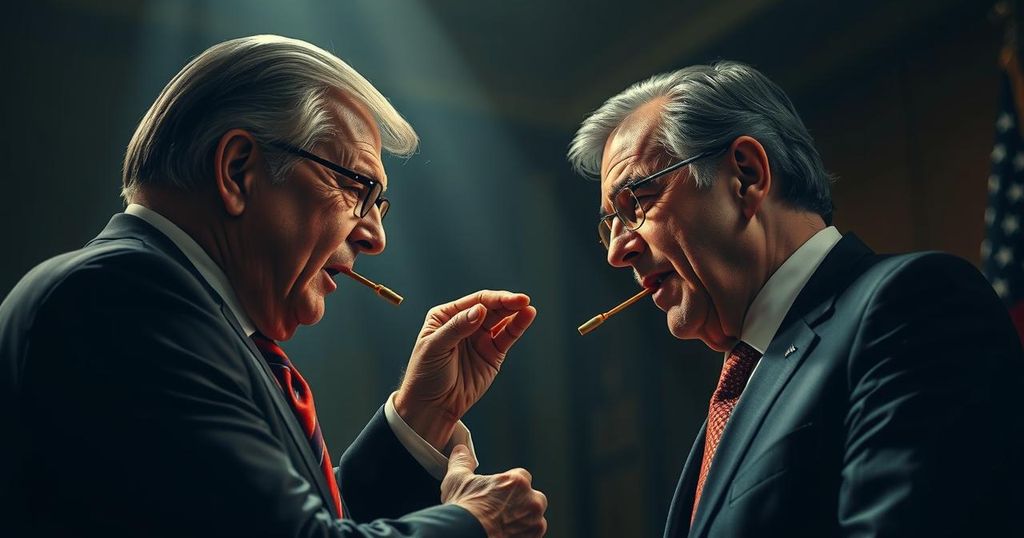World news
ASIA, BENJAMIN NETANYAHU, DONALD TRUMP, DONBAS, ENERGY INFRASTRUCTURE, EUROPE, EUROPE/ASIA, INTERNATIONAL RELATIONS, ISRAEL, KO, KOMMERSANT, KREMLIN, MILITARY, MOSCOW, NATO, PALESTINIAN AUTHORITY, RUSSIA, RUSSIA-UKRAINE WAR, UKRAINE, US PRESIDENTIAL RACE, VLADIMIR, VLADIMIR PUTIN, VOL, WAR
Ethan Kumar
0 Comments
Analyzing the Relationship Dynamics Between Trump and Putin after the Election
In the wake of Donald Trump’s electoral victory, Vladimir Putin’s actions suggest potential manipulation of Trump. The delayed congratulations and subsequent Kremlin denials of conversations regarding Ukraine highlight this dynamic. Nikolai Patrushev’s statement implies Trump has obligations to Russia, raising concerns over interference and appropriateness of their relationship. The ongoing developments require Trump to reassess his views on Putin and foreign policy.
In the aftermath of Donald Trump’s recent electoral victory, Russian President Vladimir Putin has cautiously maneuvered the narrative surrounding their relationship. Putin’s delayed congratulations left Trump contemplating the nature of their bond, especially amidst a chorus of global leaders reaching out. When Trump claimed to have warned Putin against escalating tensions in Ukraine, the Kremlin denied any such conversation occurred, highlighting a potential rift in their communication. As tensions escalate, Putin is expected to amass troops to further the conflict in Ukraine, leaving Trump to ponder the implications of their purported friendship. Moreover, Nikolai Patrushev, a prominent Russian intelligence official, suggested that Trump owes allegiance to forces that aided his election victory, evoking elements of psychological warfare that may leave Trump bewildered regarding his obligations. This statement underscores potential manipulation as Russia hints at leverage over the incoming U.S. administration. While it is documented that Russian operatives sought to influence the electoral landscape, evidence linking Trump directly to these efforts remains unproven. In the absence of direct collusion, Patrushev’s words raise concerns of possible blackmail or manipulation directed at an American president-elect, contributing to a broader Russian strategy aimed at destabilizing democratic institutions in the U.S. With his foreign policy leaning towards a rapprochement with Russia, Trump has previously downplayed allegations of Russian interference, setting the stage for his administration’s future interactions with Moscow. The prevailing sentiments within the Republican Party support a renewed relationship with Russia, which complicates the conversation surrounding military assistance to Ukraine. As Trump navigates these complexities, questions abound regarding his capacity to adapt or recognize that Putin may not be the ally he perceives. The necessity for a recalibrated understanding of international relationships will be crucial as Trump’s presidency unfolds.
The relationship between Donald Trump and Vladimir Putin has long been a subject of scrutiny. Trump’s admiration for Putin has raised concerns regarding U.S. foreign policy, particularly in relation to Russia’s aggressive actions in Ukraine. This article highlights the dynamics following Trump’s electoral victory, particularly how Putin’s behavior might manipulate or influence Trump’s approach as an incoming president, given Russia’s historical interference in U.S. elections.
In conclusion, the dynamics between Donald Trump and Vladimir Putin present a complex interplay of national interests and personal relations. As Trump steps into a new term, he must navigate the challenges of potential Russian manipulation and the implications of his foreign policy stance concerning Ukraine and NATO. Developing a clear understanding of these relationships will be essential for ensuring the integrity of democratic processes.
Original Source: slate.com




Post Comment